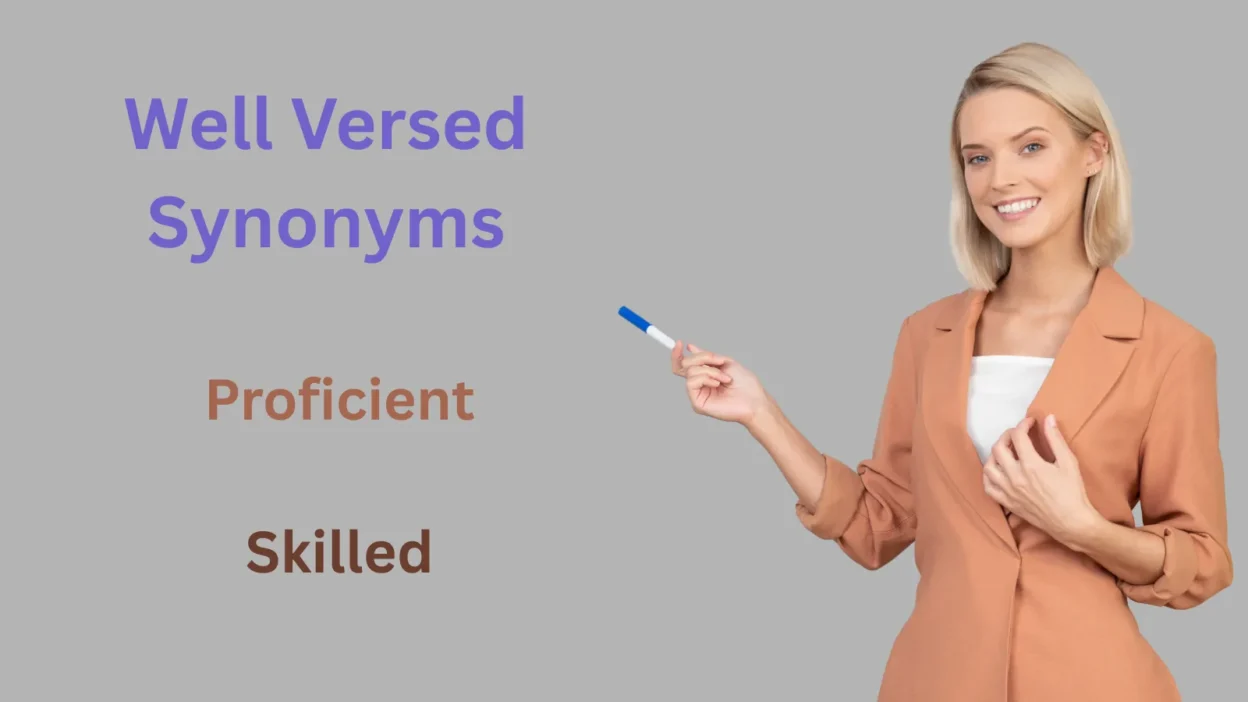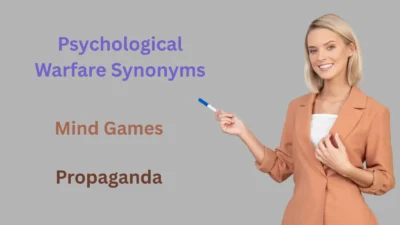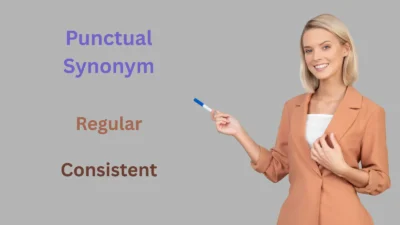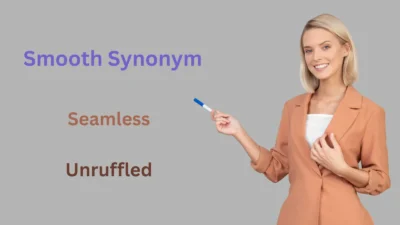Well versed synonyms, such as knowledgeable, proficient, and skilled, describe someone who has a deep understanding or mastery of a subject. For example, a person well-versed in technology can solve complex problems with ease and confidence.
Using the right synonym for well-versed helps express different levels of expertise and experience. Knowledgeable focuses on strong understanding, proficient suggests capable performance, and skilled highlights practiced ability.
If you’re writing about education, career growth, or expertise, choosing precise synonyms for well-versed makes your descriptions clear and impactful. In this guide, we’ll explore alternatives, their meanings, and how to use them naturally.
What Does Well-Versed Mean?
Well-versed means being highly familiar or experienced with a subject. It describes someone who has learned, practiced, and mastered a specific area of knowledge or skill.
A well-versed person is often:
- Knowledgeable – understands the subject deeply
- Proficient – performs tasks confidently and effectively
- Skilled – applies what they know with precision and ease
- Experienced – has learned through consistent practice
It’s not just about knowing facts — being well-versed means having the insight and ability to use knowledge wisely in real situations.
30 Synonyms & Related Words for Well Versed
1. Knowledgeable
Description: Possessing a broad or specific range of information or expertise.
Example: “He’s knowledgeable about classical music.”
Usage: Neutral and versatile; suitable for general, professional, or academic contexts.
2. Proficient
Description: Skilled and competent in doing something effectively.
Example: “She’s proficient in three languages.”
Usage: Slightly formal; best for measurable skills or abilities.
3. Skilled
Description: Having the training and ability to perform tasks effectively.
Example: “He’s a skilled negotiator.”
Usage: Common and positive; ideal for practical or technical expertise.
4. Expert
Description: Someone with a high level of knowledge or specialization.
Example: “She’s an expert in cybersecurity.”
Usage: Strongest form; formal, authoritative, and professional.
5. Seasoned
Description: Experienced and practiced over time.
Example: “He’s a seasoned journalist with decades of reporting.”
Usage: Conveys wisdom and long-term experience; ideal for veteran professionals.
6. Savvy
Description: Having practical understanding and sharp judgment.
Example: “She’s tech-savvy and keeps up with every new trend.”
Usage: Informal; great for modern, practical intelligence.
7. Accomplished
Description: Highly skilled due to achievement and practice.
Example: “He’s an accomplished pianist.”
Usage: Positive and formal; used for recognized expertise or talent.
8. Adept
Description: Exceptionally skilled or capable at doing something.
Example: “She’s adept at managing complex projects.”
Usage: Formal and flattering; emphasizes smooth competence.
9. Experienced
Description: Having gained knowledge through long practice or exposure.
Example: “He’s experienced in crisis management.”
Usage: Neutral to positive; often used in professional or technical fields.
10. Versed
Description: Well-informed or familiar with a particular field.
Example: “She’s deeply versed in ancient history.”
Usage: Slightly formal and literary; elegant substitute for “well-versed.”
11. Educated
Description: Having formal learning or intellectual training.
Example: “He’s well-educated in philosophy and literature.”
Usage: Academic tone; best for formal or scholarly contexts.
12. Informed
Description: Possessing accurate and up-to-date knowledge.
Example: “She’s well-informed about environmental policies.”
Usage: Neutral and factual; good for discussions or opinions based on awareness.
13. Competent
Description: Capable and adequately skilled to perform tasks.
Example: “He’s a competent software engineer.”
Usage: Neutral; implies reliability, not necessarily excellence.
14. Practiced
Description: Skilled through repetition and experience.
Example: “She’s a practiced speaker who engages her audience easily.”
Usage: Positive; emphasizes refinement and habit-based expertise.
15. Trained
Description: Having formal instruction or professional development.
Example: “He’s a trained architect with international experience.”
Usage: Neutral; often used in job-related or technical contexts.
16. Masterful
Description: Displaying mastery or superior skill.
Example: “Her masterful storytelling captivated the audience.”
Usage: Highly positive and artistic; suitable for creative excellence.
17. Enlightened
Description: Possessing deep understanding, often philosophical or moral.
Example: “He gave an enlightened perspective on cultural traditions.”
Usage: Elevated, reflective; good for intellectual or cultural subjects.
18. Well-informed
Description: Having accurate knowledge from reliable sources.
Example: “A well-informed voter makes better choices.”
Usage: Formal or journalistic tone; emphasizes factual awareness.
19. Learned
Description: Highly educated and scholarly.
Example: “The learned professor spoke eloquently about Greek mythology.”
Usage: Very formal or literary; suggests deep, academic knowledge.
20. Polished
Description: Refined, sophisticated, and highly skilled.
Example: “He’s a polished public speaker.”
Usage: Positive and elegant; implies both skill and grace.
21. Gifted
Description: Naturally talented or intelligent.
Example: “She’s a gifted linguist with a knack for accents.”
Usage: Positive and expressive; often implies innate ability rather than training.
22. Capable
Description: Having the ability or potential to perform tasks effectively.
Example: “He’s capable of handling complex negotiations.”
Usage: Neutral; practical in tone, suitable for workplace settings.
23. Talented
Description: Possessing natural aptitude or creative skill.
Example: “She’s a talented designer with a unique vision.”
Usage: Positive; often used for artistic or creative abilities.
24. Sharp
Description: Quick-thinking and mentally alert.
Example: “He’s a sharp analyst who spots trends before others.”
Usage: Informal and dynamic; ideal for intellectual or perceptive skill.
25. Brainy
Description: Informal word for intelligent or clever.
Example: “Her brainy solutions impressed the whole team.”
Usage: Casual and friendly; good for conversational writing.
26. Insightful
Description: Demonstrating deep understanding or perceptive judgment.
Example: “Her insightful comments improved the debate.”
Usage: Positive; perfect for analytical or evaluative contexts.
27. Astute
Description: Mentally sharp and able to assess situations effectively.
Example: “The astute manager anticipated market changes early.”
Usage: Formal or business tone; suggests strategic intelligence.
28. Erudite
Description: Deeply learned and scholarly, often with elegance.
Example: “The erudite speaker referenced multiple ancient texts.”
Usage: Very formal; ideal for academic or intellectual writing.
29. Cultivated
Description: Refined through education and experience.
Example: “He’s a cultivated gentleman with broad cultural knowledge.”
Usage: Literary or formal; evokes sophistication and culture.
30. Prodigious
Description: Remarkably impressive in skill or knowledge.
Example: “Her prodigious memory amazed her professors.”
Usage: Strong and dramatic; best for emphasizing extraordinary talent.
How to Choose the Right Synonym
Choosing the right synonym for well-versed depends on context, tone, and purpose:
- Professional Contexts: Use proficient, competent, experienced, or trained to maintain a factual and polished tone.
- Academic or Formal Writing: Words like erudite, learned, verses, and educated add intellectual weight.
- Casual or Modern Usage: Savvy, sharp, brainy, or knowledgeable feel more conversational.
- Creative or Descriptive Writing: Adept, masterful, accomplished, and polished bring elegance and style.
- Praise or Admiration: Talented, gifted, or prodigious convey positive emotional tone.
Also, consider cultural or emotional nuance:
- In business, savvy feels modern and practical.
- In academia, erudite or learned carries prestige.
- In art or performance, accomplished or masterful emphasizes grace and skill.
Conclusion :
Exploring well versed synonyms help you describe someone highly skilled, knowledgeable, or quick-witted with more variety and precision. Words like astute, brainy, and sharp each add a unique shade of meaning — astute emphasizes insight, brainy highlights intelligence, and sharp conveys alertness and quick understanding.
Using the right synonym allows you to match tone and context, whether you’re describing an expert professional, a clever thinker, or a fast learner. These alternatives make your language richer and your writing more engaging.



